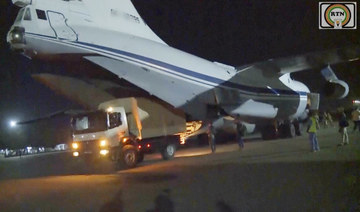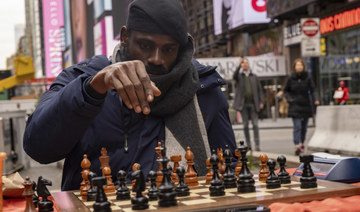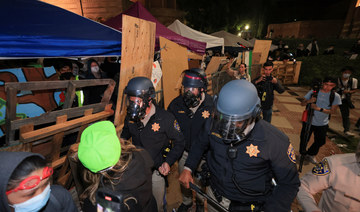MOSCOW: President Vladimir Putin on Sunday rubbished claims that Russia poisoned a former spy in Britain, on the eve of international chemical weapons experts heading to the UK to probe the attack.
“It’s complete drivel, rubbish, nonsense that somebody in Russia would allow themselves to do such a thing ahead of elections and the World Cup,” Putin told supporters after winning a fourth term as president.
“We have destroyed all chemical weapons,” he added, rejecting Britain’s claim that only Moscow could be behind the nerve agent attack on former double agent Sergei Skripal and his daughter Yulia.
The poisoning in the English city of Salisbury on March 4 has led to a diplomatic crisis, with Britain expelling 23 Kremlin diplomats.
Technical experts from Organization for the Prohibition of Chemical Weapons will visit Britain on Monday to collect samples of the nerve agent used in the attack.
“These will then be despatched to highly-reputable international laboratories selected by the OPCW for testing with results expected to take a minimum of two weeks,” said a statement by Britain’s Foreign Office.
Putin said Russia is “ready to take part in the investigation,” although earlier on Sunday British Foreign Secretary Boris Johnson accused the Russians of “smug sarcasm and denial” in response to the accusations.
Moscow’s “malign, disruptive behavior” internationally was the reason why allies were “inclined not to give Russia the benefit of the doubt,” he told BBC’s Andrew Marr Show.
Johnson also said Britain would target wealth linked to the Kremlin as a further measure following the spy poisoning.
“Where people have obtained wealth by corruption and where we can see a link with the Kremlin, with Vladimir Putin, it may be possible to have unexplained wealth orders and other sanctions on those individuals,” Johnson said.
Johnson said the government was considering something similar to the US “Magnitsky Act” which was adopted in 2012 to punish Russian officials accused of human rights violations.
The act imposed a visa ban and froze the assets of Russian officials implicated in the death of lawyer Sergei Magnitsky, a tax fraud whistleblower who died in Russian custody in 2009.
However, the minister faced awkward questions over a tennis match he played with the wife of former Kremlin minister Vladimir Chernukhin, in return for a £160,000 ($223,000, 181,500 euros) donation to his Conservative Party.
On Saturday, Russia’s ambassador to the European Union, Vladimir Chizhov, said Moscow “had nothing to do” with the attack, accusing Johnson of “acting in an inappropriate manner” by pointing the finger at Putin.
“Russia has stopped production of any chemical agents back in 1992,” he told Marr, the day after Moscow expelled 23 British diplomats in a tit-for-tat measure.
But the Foreign Office dismissed the claim, saying it had “information indicating that within the last decade, Russia has investigated ways of delivering nerve agents likely for assassination.
“And part of this program has involved producing and stockpiling quantities of Novichok,” a statement said.
Chizhov also appeared to suggest that Britain itself may have been the source of the chemical agent.
“When you have a nerve agent, you check it against certain samples you have in your laboratories,” he said.
“And Porton Down, as we now all know, is the largest military facility in the UK that has been dealing with chemical weapons research — and it’s actually only eight miles from Salisbury.”
Johnson called the accusation “satirical,” adding it was “not the response of a country that really believes itself it to be innocent.”
Putin rejects spy attack claims as chemical weapons experts head to UK
Putin rejects spy attack claims as chemical weapons experts head to UK

Cockfights still rule the roost in India’s forest villages

- India is renowned for its fanatical cricket obsession but in the central state of Chhattisgarh, cockfighting draws the crowds
- When a cockfight is on calendar, hundreds of men walk far across rivers, through dense bushland and over hills for ringside view
KATEKALYAN: The swing of a talon and a flurry of feathers leaves a rooster motionless, a cockfight bout viewed as cruel by many but which binds disparate Indian forest communities together.
India is renowned for its fanatical cricket obsession but in the central state of Chhattisgarh, cockfighting draws the crowds.
“Earlier there was no other entertainment and it helped us meet people from other villages,” Raju, whose skill in raising fighting fowl has made him something of a local celebrity, told AFP.
“Even with all the changes around us today, the sport is still very popular,” the 32-year-old added.
The forests of Bastar district are home to numerous tribal communities living in scattered villages.
India has pumped millions of dollars into infrastructure development, and new roads and mobile phone towers have brought the forest’s inhabitants somewhat closer to the outside world.
Rugged terrain and the tyranny of distance in remote Bastar district still lend few occasions for these villages to interact with each other.
But when a cockfight is on the calendar, hundreds of men will walk far across rivers, through dense bushland and over hills to get a ringside view.
“I do nothing but organize fights, raise roosters and place bets,” Bhagat, 35, of Katekalyan village told AFP.
Last month was Katekalyan’s turn to host a bout, with men from out of town ringing the fence of the dirt enclosure where roosters spar.
Most cockfights are over in the blink of an eye, with the pre-game pageantry accounting for most of the action.
Bhagat and a rival rooster owner first hold their bird’s beak to beak to gauge whether they have the necessary hostility to battle.
Both men then use twine to fix sharp blades to the claws of their charges as the crowd shouts out their small wagers on the outcome.
Along with much of the rest of the world, cockfighting is banned in numerous Indian states on animal cruelty grounds.
People for the Ethical Treatment of Animals (PETA) India calls cockfighting “barbaric,” and campaigns to shut it down for good.
But the men living in Bastar’s forests see it as an integral part of their community fabric.
Roosters that survive multiple bouts are lauded alongside their owners.
Raju said the most enduring fighters were locally remembered with the same reverence that the rest of India holds for cricketing greats like former captain Sachin Tendulkar.
“Like you have a field for cricket, this is our field,” he said.
“And the winners get fame and respect, just like Sachin did by scoring all his runs.”
Bhagat said it always grieved him when one of his animals died in combat.
“When we lose a rooster in the fight, our hearts are in pain for a few days,” he said.
“But then we get drunk, and then there will be peace.”
Russian troops enter base housing US military in Niger, US official says
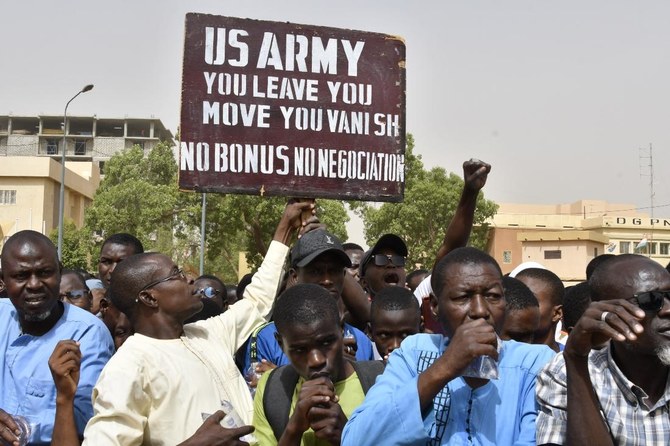
- The US and its allies have been forced to move troops out of a number of African countries following coups
WASHINGTON: Russian military personnel have entered an air base in Niger that is hosting US troops, a senior US defense official told Reuters, a move that follows a decision by Niger’s junta to expel US forces.
The military officers ruling the West African nation have told the US to withdraw its nearly 1,000 military personnel from the country, which until a coup last year had been a key partner for Washington’s fight against insurgents who have killed thousands of people and displaced millions more.
A senior US defense official, speaking on condition of anonymity, said Russian forces were not mingling with US troops but were using a separate hangar at Airbase 101, which is next to Diori Hamani International Airport in Niamey, Niger’s capital.
The move by Russia’s military, which Reuters was the first to report, puts US and Russian troops in close proximity at a time when the nations’ military and diplomatic rivalry is increasingly acrimonious over the conflict in Ukraine.
It also raises questions about the fate of US installations in the country following a withdrawal.
“(The situation) is not great but in the short-term manageable,” the official said.
Asked about the Reuters report, US Defense Secretary Lloyd Austin played down any risk to American troops or the chance that Russian troops might get close to US military hardware.
“The Russians are in a separate compound and don’t have access to US forces or access to our equipment,” Austin told a press conference in Honolulu.
“I’m always focused on the safety and protection of our troops ... But right now, I don’t see a significant issue here in terms of our force protection.”
The Nigerien and Russian embassies in Washington did not immediately respond to a request for comment.
The US and its allies have been forced to move troops out of a number of African countries following coups that brought to power groups eager to distance themselves from Western governments. In addition to the impending departure from Niger, US troops have also left Chad in recent days, while French forces have been kicked out of Mali and Burkina Faso.
At the same time, Russia is seeking to strengthen relations with African nations, pitching Moscow as a friendly country with no colonial baggage in the continent.
Mali, for example, has in recent years become one of Russia’s closest African allies, with the Wagner Group mercenary force deploying there to fight jihadist insurgents.
Russia has described relations with the United States as “below zero” because of US military and financial aid for Ukraine in its effort to defend against invading Russian forces.
The US official said Nigerien authorities had told President Joe Biden’s administration that about 60 Russian military personnel would be in Niger, but the official could not verify that number.
After the coup, the US military moved some of its forces in Niger from Airbase 101 to Airbase 201 in the city of Agadez. It was not immediately clear what US military equipment remained at Airbase 101.
The United States built Airbase 201 in central Niger at a cost of more than $100 million. Since 2018 it has been used to target Islamic State and Al-Qaeda affiliate Jama’at Nusrat Al-Islam wal Muslimeen (JNIM) fighters with armed drones.
Washington is concerned about Islamic militants in the Sahel region, who may be able to expand without the presence of US forces and intelligence capabilities.
Niger’s move to ask for the removal of US troops came after a meeting in Niamey in mid-March, when senior US officials raised concerns including the expected arrival of Russia forces and reports of Iran seeking raw materials in the country, including uranium.
While the US message to Nigerien officials was not an ultimatum, the official said, it was made clear US forces could not be on a base with Russian forces.
“They did not take that well,” the official said.
A two-star US general has been sent to Niger to try and arrange a professional and responsible withdrawal.
While no decisions have been taken on the future of US troops in Niger, the official said the plan was for them to return to US Africa Command’s home bases, located in Germany.
’Show solidarity’: Pro-Palestinian protesters camp across Australian universities
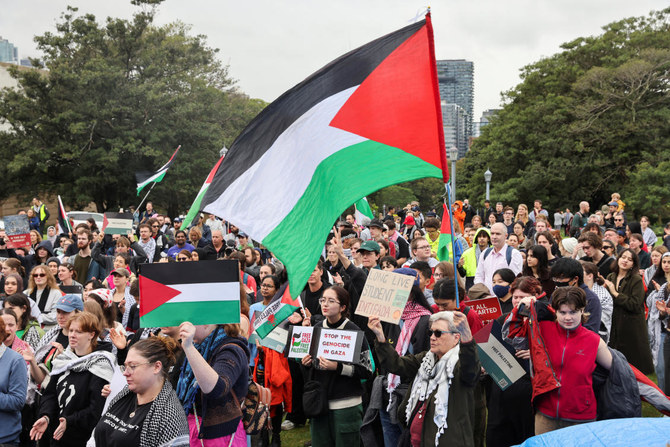
- Pro-Palestinian activists set up an encampment last week outside the sandstone main hall at University of Sydney
- Similar camps have sprung up at universities in Melbourne, Canberra and other Australian cities
SYDNEY: Hundreds of people protesting Israel’s war in Gaza rallied at one of Australia’s top universities on Friday demanding it divest from companies with ties to Israel, in a movement inspired by the student occupations sweeping US campuses.
Pro-Palestinian activists set up an encampment last week outside the sandstone main hall at University of Sydney, one of Australia’s largest tertiary institutions.
Similar camps have sprung up at universities in Melbourne, Canberra and other Australian cities.
Unlike in the US, where police have forcibly removed scores of defiant pro-Palestinian protesters at several colleges, protest sites in Australia have been peaceful with scant police presence.
On Friday, protesters rallied to demand University of Sydney divest from companies with ties to Israel, echoing calls from students in the US, Canada and France.
Standing in the chanting crowd of more than 300 with his two-year old son on his shoulders, Matt, 39, said he came to show it was not just students angry at Israel’s actions in Gaza.
“Once you understand what is going on you have a responsibility to try and get involved and raise awareness and show solidarity,” he told Reuters, declining to give his last name.
Several hundred meters away from the Sydney university protest and separated by lines of security guards, hundreds gathered under Australian and Israeli flags to hear speakers say the pro-Palestinian protests made Jewish students and staff feel unsafe on campus.
“There’s no space for anybody else, walking through campus chanting ‘Intifada’ and ‘from the river to the sea’ it does something, it’s scary,” said Sarah, an academic who declined to give her name for fear of repercussions.
University of Sydney vice chancellor Mark Scott told local media on Thursday the pro-Palestinian encampment could stay on campus in part because there was not the violence seen in the US
While several police cars were parked at the entrance to the university, no police were present at either protest.
Long a stalwart ally of Israel, Australia has become increasingly critical of its conduct in Gaza, where an Australian aid worker was killed in an Israeli attack last month.
Pro-Palestinian protesters said the government had not done enough to push for peace and led the crowd in chants against Prime Minister Anthony Albanese and his government.
UK’s Labour claim big early win over PM Sunak’s Conservatives

- Voters cast their ballots on Thursday for more than 2,000 seats on local authorities across England
- Blackpool South was the only parliamentary seat up for grabs after the incumbent, elected in 2019 as a Conservative candidate, quit over a lobbying scandal
LONDON: Britain’s opposition Labour Party won a parliamentary seat in northern England on Friday, inflicting a heavy loss on the governing Conservatives at the start of what could be a bruising set of results for Prime Minister Rishi Sunak.
The thumping victory set the tone for what will be a closely watched two days of results ahead of a full national election this year, which polling shows could put Labour Leader Keir Starmer in power and end 14 years of Conservative government.
Voters cast their ballots on Thursday for more than 2,000 seats on local authorities across England and a handful of high-profile mayoral elections, including in the capital, London.
Blackpool South was the only parliamentary seat up for grabs after the incumbent, elected in 2019 as a Conservative candidate, quit over a lobbying scandal.
Labour candidate Chris Webb won the Blackpool election with 10,825 votes. The Conservative candidate came in second with 3,218.
The defeat in Blackpool and early signs of losses at the council level will boost Labour’s hopes for a sweeping victory over Sunak’s Conservatives in the national election.
“This seismic win in Blackpool South is the most important result today,” Starmer said.
“This is the one contest where voters had the chance to send a message to Rishi Sunak’s Conservatives directly, and that message is an overwhelming vote for change.”
Sunak’s Conservatives are about 20 percentage points behind Labour in most opinion polls for a national election, which Sunak intends to call in the second half of the year.
The first 500 of the more than 2,600 local council results showed Labour making gains at the expense of the Conservatives — in line with finance minister Jeremy Hunt’s pre-vote prediction of significant losses for the governing party.
Although local elections do not always reflect how people will vote in a national contest, a heavy defeat could trigger fresh anger in the Conservative Party over Sunak’s leadership and the prospect of losing power.
The extent of that unrest could hinge on the results of two mayoral elections in which the Conservatives hope to show they can still hold ground in central and northeast England.
The Tees Valley mayoral result is due on Friday, while the West Midlands mayor is to be announced on Saturday. The result in London, where current Labour mayor Sadiq Khan is expected to win another term is also due on Saturday.
More than 2,100 people have been arrested during pro-Palestinian protests on US college campuses

- At least 50 incidents of arrests have happened at 40 different US colleges or universities since April 18
- The demonstrations began at Columbia on April 17 with students calling for an end to the Israel-Hamas war
LOS ANGELES: Police have arrested more than 2,100 people during pro-Palestinian protests at college campuses across the United States in recent weeks, sometimes using riot gear, tactical vehicles and flash-bang devices to clear tent encampments and occupied buildings. One officer fired his gun inside a Columbia University administration building while clearing out protesters camped inside, a prosecutor’s office confirmed.
No one was injured by the officer’s actions late Tuesday inside Hamilton Hall on the Columbia campus, according to Doug Cohen, a spokesperson for District Attorney Alvin Bragg’s office. Cohen said Thursday that the gun did not appear to be aimed at anyone, and that there were other officers but no students in the immediate vicinity. Bragg’s office is conducting a review, a standard practice.
More than 100 people were taken into custody during the Columbia crackdown, just a fraction of the total arrests stemming from recent campus protests over the Israel-Hamas war. A tally by The Associated Press on Thursday found at least 50 incidents of arrests at 40 different US colleges or universities since April 18.
Early Thursday, officers surged against a crowd of demonstrators at University of California, Los Angeles, ultimately taking at least 200 protesters into custody after hundreds defied orders to leave, some forming human chains as police fired flash-bangs to break up the crowds. Police tore apart a fortified encampment’s barricade of plywood, pallets, metal fences and dumpsters, then pulled down canopies and tents.
Like at UCLA, tent encampments of protesters calling on universities to stop doing business with Israel or companies they say support the war in Gaza have spread across other campuses nationwide in a student movement unlike any other this century. Iranian state television carried live images of the police action at UCLA, as did Qatar’s pan-Arab Al Jazeera satellite network. Live images of Los Angeles also played across Israeli television networks.
Israel has branded the protests antisemitic, while Israel’s critics say it uses those allegations to silence opposition. Although some protesters have been caught on camera making antisemitic remarks or violent threats, protest organizers — some of whom are Jewish — call it a peaceful movement to defend Palestinian rights and protest the war.
President Joe Biden on Thursday defended the right of students to peaceful protest but decried the disorder of recent days.
Opinion
This section contains relevant reference points, placed in (Opinion field)
The demonstrations began at Columbia on April 17 with students calling for an end to the Israel-Hamas war, which has killed more than 34,000 Palestinians in the Gaza Strip, according to the Health Ministry there. Israel launched its offensive in Gaza after Hamas militants killed about 1,200 people, mostly civilians, on Oct. 7 and took roughly 250 hostages in an attack on southern Israel.
On April 18, the NYPD cleared Columbia’s initial encampment and arrested roughly 100 protesters. The demonstrators set up new tents and defied threats of suspension, and escalated their actions early Tuesday by occupying Hamilton Hall, an administration building that was similarly seized in 1968 by students protesting racism and the Vietnam War.
Roughly 20 hours later, officers stormed the hall. Video showed police with zip ties and riot shields streaming through a second-floor window. Police had said protesters inside presented no substantial resistance. At some point, the officer’s gun went off inside the building. Cohen, the DA’s spokesperson, did not provide additional details on the incident, which was first reported by news outlet The City on Thursday. The NYPD did not immediately respond to AP’s request for comment.
The confrontations at UCLA also played out over several days this week. UCLA Chancellor Gene Block told alumni on a call Thursday afternoon that the trouble started after a permitted pro-Israel rally was held on campus Sunday and fights broke out and “live mice” were tossed into the pro-Palestinian encampment later that day.
In the following days, administrators tried to find a peaceful solution with members of the encampment and expected things to remain stable, Block said.
That changed late Tuesday, he said, when counterdemonstrators attacked the pro-Palestinian encampment. Campus administrators and police did not intervene or call for backup for hours. No one was arrested that night, but at least 15 protesters were injured. The delayed response drew criticism from political leaders, including California Gov. Gavin Newsom, and officials pledged an independent review.
“We certainly weren’t thinking that we’d end up with a large number of violent people, that hadn’t happened before,” Block said on the call.
By Wednesday, the encampment had become “much more of a bunker” and there was no other solution but to have police dismantle it, he said.
The hourslong standoff went into Thursday morning as officers warned over loudspeakers that there would be arrests if the crowd — at the time more than 1,000 strong inside the encampment as well as outside of it — did not disperse. Hundreds left voluntarily, while another 200-plus remained and were ultimately taken into custody.
Meanwhile, protest encampments at other schools across the US have been cleared by police — resulting in more arrests — or closed up voluntarily. But University of Minnesota officials reached an agreement with protesters not to disrupt commencements, and similar compromises have been made at Northwestern University in suburban Chicago, Rutgers University in New Jersey and Brown University in Rhode Island.
Ariel Dardashti, a graduating UCLA senior studying global studies and sociology, said no student should feel unsafe at school.
“It should not get to the point where students are being arrested,” Dardashti said on campus Thursday.





